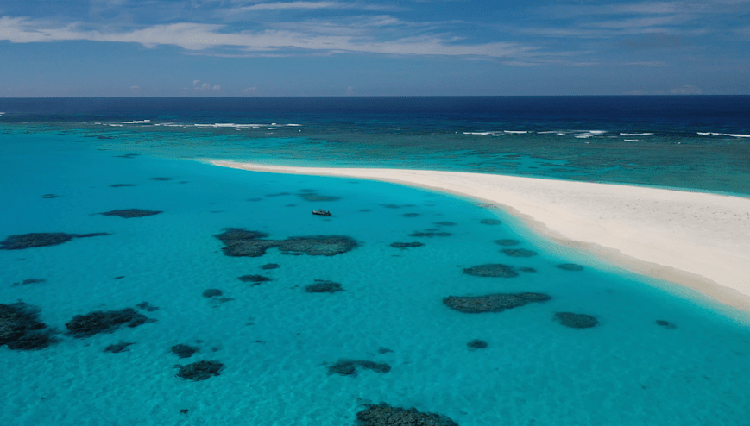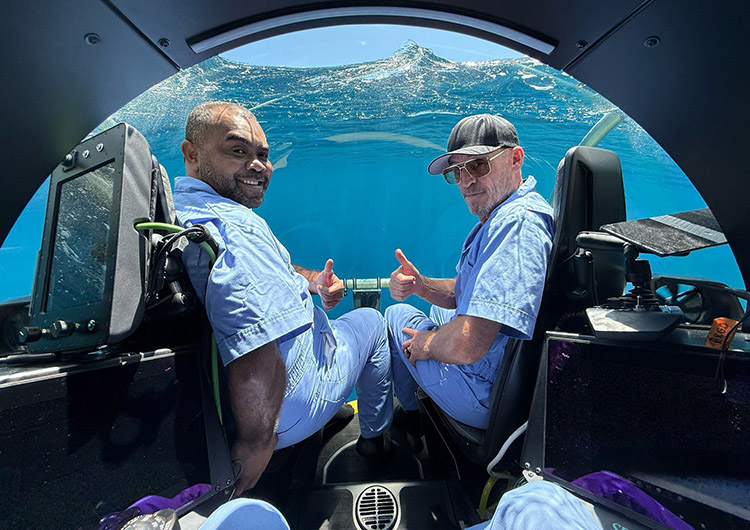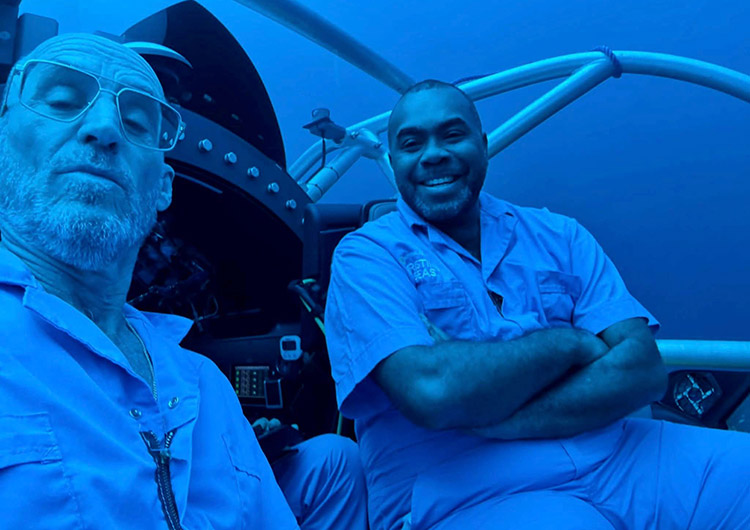
A team of scientists and filmmakers from National Geographic Pristine Seas begins its expedition this week in support of marine protections in Fiji and Rotuma. The crew, which is made up of local and international experts, will study the South Pacific waters from the deep sea to shallow reefs.
The expedition is taking place between April and September at the invitation of Fiji’s government. In partnership with the Ministry of Environment and Climate Change, the Ministry of Fisheries and Forests, Ministry of iTaukei Affairs, and Blue Prosperity Fiji, Pristine Seas will provide key data about the ocean’s health and create two documentary films about communities’ special relationship with the sea.
The team’s first stop is Rotuma — a volcanic island surrounded by uninhabited islets — that is a self-governing dependency of Fiji. To date, there has been no research conducted in Rotuma's biodiverse deep-sea ecosystems. These vast, dark depths could harbor hundreds of extraordinary species adapted to extreme conditions.
"Exploring our ocean under the stewardship of Rotuma and her people is a milestone achievement,” said Chairman of the Council of Rotuma, Gagaj Manav. “The Council of Rotuma welcomes National Geographic Pristine Seas to Rotuma to help us better understand the richness of our ocean. Rotuma is committed to protecting our cultural heritage anchored in the ocean that surrounds us and to safeguarding our people's wellbeing through science, education, awareness, cooperation-assistance, and well-meaning dialogue."
Fiji and Rotuma’s lush underwater ecosystems are home to marine turtles, humpback whales, reef fish, manta rays, sea snakes, corals and more. Several species — like dwarf gobies, pygmy gobies and the Fiji petrel — are found only in Fiji and Rotuma. In studying this unique wilderness, the Pristine Seas team hopes to highlight the beauty of the ocean and the power that marine protected areas have to restore wildlife, strengthen economies, increase food security and build climate resilience.
“Fiji has a rich culture of traditional ocean management and conservation through qoliqoli and tabus,” said Kevin Chand, Senior Director Pacific Ocean Policy for Pristine Seas. “Fiji has made enormous progress in recent years to protect its ocean. Our expeditions aim to leverage and complement this work and support Fiji as it seeks to achieve its conservation goals by 2030. Being from Fiji with a maternal connection to Rotuma, I’m doubly excited to be part of this expedition and work closely with communities here.”
In Fiji, the team will study dozens of locally managed marine areas (LMMAs or Tabu areas) in Kadavu. After, they will study areas including the Great Astrolabe Reef and Great Sea Reef (two of the longest barrier reefs in the world) and the Melanesian Border Plateau — a system of undersea ridges, seamounts, and banks of volcanic origin that extends across the Solomon Islands, Fiji, Tuvalu, and Tonga. In the Ringgold Islands, the team will carry out seabird surveys to learn more about the Lesser Frigatebird and Red-footed Booby.
Gathering biodiversity information from locally protected marine areas and previously unexplored ecosystems, the results can help inform local ocean management and protection efforts.
“As an island nation dependent on the ocean for its sustenance and livelihoods, Fiji has committed to protect our ocean ecosystems to support ocean health, productivity and resilience,” said Sivendra Michael, Permanent Secretary, Ministry of Environment and Climate Change. “We have invited National Geographic Pristine Seas to support our commitment to protect 30% of our ocean by 2030. The Pristine Seas team of local and international researchers will provide the science and data key to identifying our marine biodiversity hotspots we need to protect.”
Living and working aboard the Argo research vessel, the team will assess the ocean’s health with deep sea cameras, SCUBA dive surveys, seabird counts, underwater visual surveys, environmental DNA (eDNA) sampling, micropaleo sampling and more.

Pristine Seas’ new submersible, the Argonauta, will enable team members to explore the deep sea. An underwater science lab, the sub can dive 1,300 meters and quietly maneuver in all directions, much like a drone. It can get close to reefs, walls, and seamounts in a safe and unobtrusive manner. Passengers will be able to view underwater life from every angle and in real-time.
“Our researchers survey all sorts of marine environments, from shallow coral reefs to the deep sea. We document marine life ranging from tiny invertebrates to sharks and marine mammals,” said Kat Millage, lead scientist for Pristine Seas’ expedition in Fiji and Rotuma. “The most important part of our research is collaborating with local scientists. When we take our cues from traditional knowledge — which demonstrates that protection and production can co-exist — we all win.”
The expedition will build upon knowledge from Blue Prosperity Fiji’s nationwide assessment of coral reefs in 2023. The new research will fill data gaps in key areas identified as potential conservation targets. After the expedition, Pristine Seas will provide critical information to Fiji government to inform opportunities to expand and enhance marine protections.
“We are proud to partner with National Geographic Pristine Seas on its upcoming expedition in Fiji, which will build upon and complement research from partners across Fiji gathered during the 2023 nationwide coral reef survey, led by the Government and Blue Prosperity Fiji," said Saras Sharma, Fiji Country Manager, Blue Prosperity Fiji. "This expedition will deepen the understanding of Fiji’s marine ecosystems, support sustainable ocean management and Fiji’s commitment to sustainably manage 100% of its ocean and fully protect 30% of its ocean by 2030."
In collaboration with National Geographic Education and the Fiji Ministry of Education, educators and students will board Pristine Seas’ dedicated research vessel, the Argo, to meet the scientists, filmmakers and crew, so they can explore exciting career paths and learn more about marine science.
In partnership with Birdlife Fiji, Pristine Seas will also study the waters off Gau Island to try and locate Fiji petrels at sea in order to determine the location for their nesting grounds on land. The effort aims to shed light on one of the rarest and least understood bird species in the world.
Pristine Seas started its Global Expedition in 2023 with a mission to spend five years exploring the tropical Pacific and supporting communities and governments in their efforts to protect the ocean. The Fiji expedition will be the ninth stop on the Global Expedition. Previously, the team has explored and studied the Southern Line Islands, Tongareva, Niue, The Republic of the Marshall Islands, the Federated States of Micronesia, Palau, Papua New Guinea and the Solomon Islands. For updates from the expedition follow @natgeopristineseas on Facebook, Instagram, TikTok.




